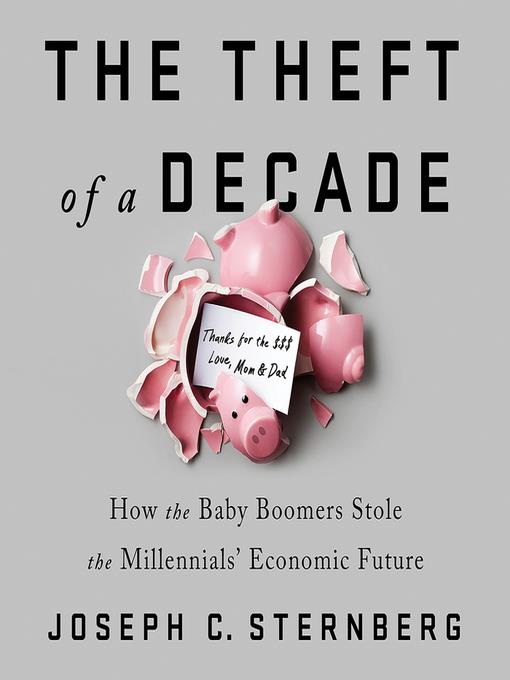
The Theft of a Decade
How the Baby Boomers Stole the Millennials' Economic Future
کتاب های مرتبط
- اطلاعات
- نقد و بررسی
- دیدگاه کاربران
نقد و بررسی

March 25, 2019
Wall Street Journal editor Sternberg provides a riveting account of the economic fallout of the 2007–2009 Great Recession, which drastically diminished the financial outlook for an entire generation of Americans. Sternberg demonstrates how this recession affected the employment options of the then-youngest American workers, as entry-level job openings constricted and older Americans were forced to put off retiring, preventing younger workers from advancing into higher-level positions. He argues the student debt crisis is largely a result of baby boomers encouraging youth to think of college as an “investment,” despite strong evidence from economic studies that this is not always the case. He also narrates in detail the history of home ownership in America, culminating in a critical analysis of the irresponsible mortgage lending practices that fed into the crash. Sternberg’s account is distinctly nonpartisan, critiquing both Reagan-era supply-side economics and the Affordable Care Act’s lengthy delaying of the taxes that are meant to pay for it. Sternberg carefully guides the reader through a rather labyrinthine thicket of complicated terms and numbers in largely accessible fashion. This is a must-read for cash-strapped millennials seeking to learn precisely how employment, investment, taxation, and the government’s social safety net programs have changed drastically over the past generation. Agent: Zoe Pagnamenta, Zoe Pagnamenta Agency.

April 1, 2019
Of spendthrift elders and strapped youth, their respective lots accidents of birth mixed with a hefty dose of politics. Born in 1982, Wall Street Journal editorial board member Sternberg immediately indicates his thesis in the subtitle: The economic habits of the baby boomer generation, born "between the end of World War II and the introduction of the birth control pill," will weigh forever on later generations. In 2020, millennials will be more numerous than boomers, but boomers will nevertheless be a burden for decades to come, draining social welfare funds even as their younger counterparts struggle to foot the bill. For the last decade, writes the author, "the main entitlement trend has been that Millennials are losing the ability to pay for these benefits. The evaporation of a political willingness to pay won't be far behind." Numerous trends contribute to this situation, foremost the fact that many millennials are outside the normal job track, having come of age during the Great Recession and never having been able to catch up. Sternberg's account opens with the rather frivolous example of the price of avocado toast, but it builds on more substantial turf, including the elusiveness of the dream of owning a home, finding a meaningful way to participate in the workforce, and saving money for future needs. As it is, he writes, millennials have been staying in school (and in their parents' homes), at great cost not just to themselves, but to the larger economy. Sternberg's argument is made without rancor, but parts of it seem misplaced: The chief enemies of the millennials would seem to be structural and predate the earlier birth cohort. However, he also makes the good point that people born into times of plenty behave economically differently from those born into times of want, with the result that members of the younger group "appear to be the most financially cautious generation since the cohort who grew up in the middle of the Great Depression." A suggestive essay in demographics and political trends.
COPYRIGHT(2019) Kirkus Reviews, ALL RIGHTS RESERVED.

























دیدگاه کاربران